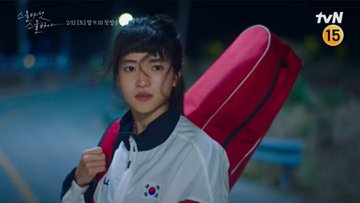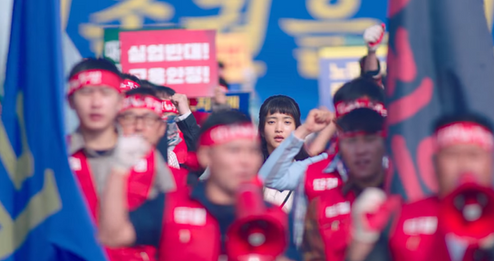6 Reasons Why Twenty Five Twenty One Is A Global Hit
- mh-musings
- Mar 2, 2022
- 10 min read
Updated: Mar 15, 2022
Coming of age stories are common, but the standouts manage to draw upon nostalgic elements that cut across generations. Currently running K-Drama Twenty Five Twenty One is one such story.
Set against the historical backdrop of the 1997-98 IMF crisis, we are introduced to a group of youngsters from different stations in life, all affected diversely by this economic meltdown.
When spirited 18 year old Na Hee-Do, daughter of a renowned news anchor, loses her high school fencing team due to lack of funding, she becomes desperate to transfer to Tae Yang High School, that her fencing idol Ko Yu-Rim attends. Feeling robbed of her dreams by the times, Hee-Do goes to extraordinary lengths for the transfer. In the process, she meets a young man, Baek Yi-Jin, whose life changed overnight as a result of the crisis.
Yi-Jin is now a college dropout after his father went bankrupt, an event that scatters his various family members in opposite directions. Considered a financial criminal on the hunt by his creditors, Yi-Jin’s father is in hiding and the beloved elder son of the family is left to fend for himself by working multiple odd jobs. He struggles to find a steady job worthy of his education and knowledge, or walk through society with his head held high.
Hee-Do and Yi-Jin’s fortuitous meeting change each other for the better.
At her new school, Hee-Do makes friends with Ji Seung-Wan, the top girl and head of the Broadcasting club, and Moon Ji-Woong, the cool trendsetter that the girls dream of. Friends since childhood, Seung-Wan and Ji-Woong are often mistaken as a couple, whereas his only real crush is Ko Yu-Rim. Ko Yu-Rim is an Olympic gold medalist in fencing, but she is from a family of humble means who used to be supported by Yi-Jin’s family. With the bankruptcy, Yu-Rim’s sponsorship gets affected, and remaining at the top of her game is crucial to her ability to continue with the sport.
Baek Yi-Jin rents a small room at Seung-Wan’s home, and it is revealed that he is an alumnus of Tae Yang High School, heading the Broadcasting club during his tenure. Thus, the school becomes the glue that brings this group into each other’s lives, among other interweaving threads. And we see how their lives, love and relationships evolve as an aftermath of the times.

The writing and execution for the show is flawless, posting high local ratings and claiming a spot in the top 10 Netflix shows globally in its third week of airing. The plot moves at a clip pace while the backbone of the story – the love between Na Hee-Do and Baek Yi-Jin – is unveiled over the years. Per the story’s summary, they meet when they are 22 and 18, hurt each other when they are 23 and 19, learn to trust each other at 24 and 20, and fall in love at 25 and 21; thus the title. It is also said to be inspired by the 2013 song Twenty Five Twenty One by the Korean rock band, Jaurim.
The narrative interlaces between present day and the past, through Hee Do’s ballerina daughter Kim Min-Chae, who is learning about her mother’s history while reading through her old journals. It remains unclear as to what happened to their love story and whether they are still together in present time.
As the present world is beginning to come out of the paralysis from the COVID pandemic, the story also focuses on a time when the country was coming out of a similarly paralyzing economic disaster. The two eras are interestingly tied together with Min-Chae, who walks into her ballet competition with her mask on, and who then retreats to Hee-Do’s childhood home, immersing herself in her mother’s distant past.

With high social media engagement validating the strength of the story, this is one of the best shows of the season. Here are the top notes for why I think the show is being received so well, especially by the international audience.
1. Cultural Awakening
Whether you are a newbie to KDrama or a veteran, learning about the South Korean economy and culture as it tried to recover from the difficulties of the 97-98 financial crisis is interesting. With clever insertions of issues such as the gold collecting campaign; the hiring of high school graduates after vocational exams; demand for labor reforms; the ways failed chaebol families had to respond to abrupt bankruptcies; the decline of Chungmuro, Korea’s film industry; and more of such details, one forms a robust picture of the macro social movements of the time and how it shaped everyday life for regular, hard-working people. It also insinuates the moral values surrounding family honor and general patriotism that allowed the country to raise more than 2.2 billion US dollars from public gold donations designed to reduce the national debt burden.
The writer Kwon Do-Eun outdoes herself in blending in such instances into a tight narrative where each of these components are given just the right amount of time for the audience to internalize the broader context within which the characters build their stories.
2. Feminist Overtones
I have a bias for strong female characters. Na Hee-Do is exceptional and played to perfection by the versatile Kim Tae-Ri. In addition to her pure heart, her love for her sport outstrips any toxic competitive spirit to win, and she graciously accepts that she has not been fulfilling her potential. While navigating a complicated relationship with her widowed mother, she doesn’t give up hope that she can get better with hard work. For her, the journey is far more enriching than the destination and her optimism becomes the guiding light for the struggling Yi-Jin.

In survival mode while accepting his life’s suddenly changed position, Yi-Jin feels he has lost the right to any happiness. His father’s public failure led to the despair of many families and Yi-Jin feels the emotional burden to make it right somehow. In order to appease some of those affected, he promises never to experience happiness again and vows to work towards paying them back. It is Hee Do who wisely tells him that the times took everything from him; he shouldn’t give up his happiness as well. Her passion inspires him to try harder; her achievements encourage him to reach higher; her laughter teaches him to turn tragedies into comedy; and, in Hee Do, he finds the strength to pick himself up again.
While Yi-Jin also becomes the pillar of support and encouragement Hee-Do needs in her life, it is refreshing to see a female character exude strength and astuteness without becoming a martyr for the sake of the relationship. The fact that she is an international star athlete is a bonus to her characterization.
In addition to Hee Do, we see other women of strength and substance in her mother; Ko Yu-Rim and Seung-Won and their mothers; Hee-Do’s coach, to name a few. In different places in life personally and professionally, they are all shown to be self-empowered women. Even Yi-Jin’s mother possesses a quiet strength and wisdom despite her apparent misery from being separated from her husband and life partner.
Whether a conscious choice or a subliminal one, I have loved watching all these female characters who do not fall prey to the hysterics typical in the average drama.
3. Parallelism
The communication gaps between mother and daughter are enlightening, both between Hee-Do and her mother, and Hee-Do and her daughter. It shows how we often repeat the same patterns in our lives without meaning to.
Becoming a well-known news anchor at an agency with predominantly male colleagues must not have been an easy journey for Shin Jae-Kyung. She sets a high bar for work ethics and success, and became discouraged with Hee-Do’s repeated losses at competitions during her adolescent years. To stave off further disappointment, Jae-Kyung wants for Hee-Do to re-focus her energies on other pursuits likely to bring her more life accomplishments.

When Hee-Do makes it into the national team, Jae-Kyung’s big concern becomes how Hee-Do appears in public, and insists on having new photos taken. When Hee-Do is disappointed in her mother’s lack of pride in her achievements, Jae-Kyung says, “I am not here to congratulate you. I am here to make people congratulate you.” This summarizes their relationship at this moment in time. A self-driven mother who thinks continuously raising the bar for her daughter is the best form of parenting, and a feisty daughter who believes she needs to achieve her goals despite her mother’s apparent constraints.
In her turn to be a mother, Hee-Do approaches it in the way she would have wanted mothering from her own. She is encouraging and wants Min-Chae to love her craft for itself, whether she wins or not. Hee-Do ignores Min-Chae’s growing disdain for ballet, not understanding Min-Chae’s anxiety associated with filling her mother’s very big shoes. Feeling pressured to have a life dream like her mother had, her rebellion is rooted in asserting having no dream at all.

Though the dynamics are a little different, the underlying theme is the same. Mothers and daughters will go through a complicated phase where neither speak the other’s language. It is only with time and experience that the distance can heal. In the story, as Min-Chae discovers her mother’s struggles through her old journals, she begins to have a greater appreciation for the woman her mother is today. Perhaps we will see Hee-Do have a similar epiphany about her own mother at some point as well.
4. Brilliant Fundamentals
Well executed sports dramas have an element of excitement by the nature of the subject matter. It is the same reason spectator sports are such a thriving enterprise. The focus on fencing, an elegant competitive sport that has been increasing in popularity and finesse in South Korea, is an excellent choice to use as the platform to show the character growth for Hee-Do, Baek Yi-Jin and their peers.

In reality, the first South Korean women’s fencing Olympic gold was won at the 2012 London Games, by Kim Ji-Yeon, not to be mistaken by Kim Ji-Yeon aka Bona, who plays Ko Yu-Rim! The writer takes creative license and has Ko Yu-Rim be an Olympic gold medalist at the 1996 games in Atlanta. At that time, she would have been 16 years old and such a historic win would cement her position as the nation’s darling, which we see play out in how the national coach and sponsors favor her.
This dynamic is foundational to her dislike for Hee-Do, who she sees as a threat and an entitled brat. Surely, Hee-Do knows nothing about the struggles of becoming an international athlete as an off-spring of a financially challenged family.
Hee Do in the limelight
As this rivalry deepens, we see Hee-Do’s journey of self-improvement and growth against formidable odds. The fencing scenes in flashy sports arenas and practice gyms are strikingly filmed by Director Jung Ji-Hyun. The actors’ practiced moves make it all very believable and adds to the grandiosity of the production.
5. Time Capsule
Through use of colors, artifacts, fashion choices, physical spaces, depiction of events and more, the parts of the story being shown in the ‘90s are very relatable. There is an innate simplicity in the ways of life, with the human engagement seemingly stronger and more intense. People take the time to look at each other as opposed to stare into their phones, and the relationships that evolve have a depth to them.

The director and cinematographer are outstanding with the visual aesthetics, and there are many standout scenes that capture the soul of moment, set in the context of the time being depicted. My favorites so far are from Episode 5, with Hee-Do and Yi-Jin separated by miles, ensconced in old fashioned phone booths while they call their pagers to hear the other’s voice message over and over again.
The poignancy of the scene is memorable on multiple dimensions. The frames, aesthetically crafted, capture their loneliness, the passage of time while they are separated, their comfort in each other. The forgotten land phones without the ubiquitous cell phone depict a time when distances felt bigger, the yearning quieter but stronger. There is no social media platforms to visit for dopamine hits and overexposure, and the simple act of spending money to hear the other’s voice again has a romanticism that is hard to recreate in modern life.
6. Soulmates
Yi-Jin’s mother tells him that he should find “someone who inspires you to improve just by being together. That is what a truly successful life is.”

As Hee-Do and Baek Yi-Jin unfold as a pair, this is elementary to what binds them together. Watching her enthusiastic optimism, drive and hard work to achieve her goals inspires Yi-Jin to become better. For Hee-Do, his quiet support and wisdom, his calm voice telling her how she’s the most successful fencer at losing and how those losses have built the staircase she climbed on the eve of her success, give her courage. His blind faith in her as he leaves her with a sword, claiming her a national team member even before she goes for her tryouts, helps her keep him within her regardless of being apart.
She sees in him the same indomitable spirit that she has, even though he has been hit hard by life circumstances outside of his control. Praying for his suffering to lessen, she quietly accepts his sudden disappearance without any questions asked, and continues to try her best with her fencing career. Her achievements reach him vicariously, and they both await the day they can meet again.

Neither has a name for their relationship but the depth of their feelings is crafted and portrayed beautifully. They grow organically through their everyday interactions, both having an innate understanding of, and respect for, each other without having to say the words. Both root for the other’s success without expectations.
There is no contrived shared history that tie them together but, as Yi-Jin says, they were destined to meet each other at some point in their lives because their destination is the same.
I cannot capture in words the exquisiteness of their relationship as two young people struggling with their life’s goals and aspirations find a sense of home in each other. This is the kind of love story that leaves an indelible mark on the soul.
Concluding thoughts

There are many other plot arcs that make it such a pleasurable watch. Relationship dynamics are unveiled in layers, keeping a surprise around every corner. No wonder social media glows up with hypotheses and conjecture about what’s coming. Fan edits and theories are ever growing in an engaged fandom across the globe because, as I tried to articulate here, there are elements of the story and well sketched out characters that speak to a wide swathe of the audience.
Performances by the entire cast is great but Kim Tae-Ri as Hee-Do and Nam Joo-Hyuk as Yi-Jin are particularly brilliant at capturing the ways the characters complement each other. The script is a good blend of philosophical explorations set against world events, soulful journeys of life growth, action sequences through the games, and several comical skits to lighten the mood. It takes a full team effort from the cast, crew and writer to create an experience for the viewer where we can go from tears to indignation to laughter within minutes. Kudos to a job well done.

Lastly, Squid Game may have dominated the ratings with its contrarian, dystopian story that challenges the social order in a fantastical way, but Twenty Five Twenty One is rising the ranks as an uplifting, realistic story that makes the most of a given social order, making it relatable for multiple generations of viewers. The story heals and gives hope in equal measures, leaving a fandom desperate for a heart-warming and happy finale.
(c) mh musings
If you enjoyed this piece, please go to the footer to subscribe to my blog!
@ Article Copyright by mh./ [@entrespire, twitter]. Follow me on Instagram: @soul_phoems
* All pictures and video clips belong to their original owners. No Copyright infringement intended.
* * Please ask permission for any reprints.

















